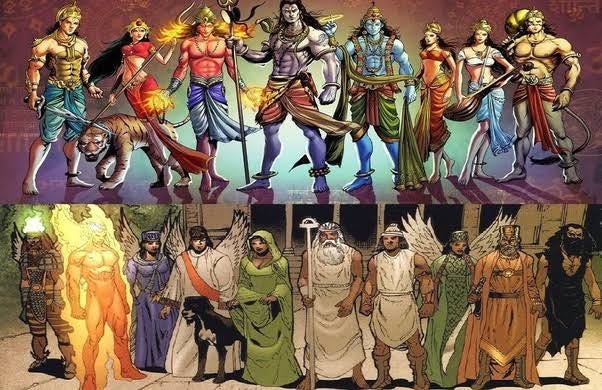Greek and Hindu Mythologies: Are these two sides of the same coin?

The origins of Globalisation is sometimes placed in the modern era with the discovery of trade routes. If we go further, we can also see its roots in the ancient world through Tyrian/Phoenician civilizations, trading in their famous purple dye, whose success can also be attributed to the invention of Phoenecian Alphabet. As per Greek Mythology, this was in Levant (present-day Lebanon) where Cadmus and the other Tyrian brothers set out in search of their sister Europa who had been abducted by Zeus, in the form of a white bull. History and mythology gets beautifully intertwined. And when we look at various mythologies- specially Greek and Hindu Mythology- the similarities are so striking that one cannot help but wonder that may be the stories came down from common ancestors and branched out into different versions and cultures. How this could be possible, or whether there is any truth in it- it’s is hard to say but the thought itself has always been quite intriguing.
The Similarities
The Holy Trinity of Hindu Mythology- Brahma Vishnu Maheshwara- are very similar to the 3 supreme Gods- Zeus (the king of Gods), Poseidon (God of seas) and Hades (his realm was the underworld/hell).
Zeus in many other ways is also similar to Indra - having numerous affairs and wives and transforming forms to have his way. Zeus’s preferred weapon is thunderbolt (a gift from Cyclopes for releasing them from the depths of Tartarus) . In Hindu Puranas, Indra hurls thunderbolts whenever angered, and is closely associated with sky and rain.
The Hindu Gods reside on Mount Kailasa just as Greek Gods call Mount Olympus their home and conduct all their administrative activities from there.
We have the recurring theme of child’s existence threatened by his father, due to prophecy, and hence raised in secret. This is similar to the threat to infant Krishna from father-figure Kansa, who is his maternal uncle.
The concept of Heaven and Hell is very similar too, with your deeds in the mortal life accounting for your place in the hell( I say only hell as heaven is placed in hell in some versions). The judges of the Underworld (Minos, Rhadamanthus and Aecus) decide whether an individual led a heroic, average or wicked life. The heroes/exceedingly righteous mortals were transported to the Elysian Fields. Souls who reincarnated three times, leading a heroic and virtuous life on each occasion, earned themselves a transfer from Elysium to the Isles of the Blessed- something similar to Moksha.
Thanatos is Death just as Mrityu is the goddess of death in Hindu Mythology. God of death- Yamraj is Hades (he was allocated the underworld in a lottery in which Poseidon got the seas). Initially he had less work as there were no mortals but once Zeus came up with the idea of human beings for his own amusement, there was no looking back.
The origin of human beings is also an interesting story with Zeus persuading Prometheus to create these mortals for his entertainment and also to have someone populate the world and worship Gods. Prometheus, like our creator Brahma, did not fancy being worshipped and chose to stay closer to human communities, teaching them. You will infact notice that despite being part of the Holy Trinity, there are very few temples of Brahma.Other Gods are pretty proud and egoistic that way.
If we go on, the similarities are endless- Eros is Kaamdeva. Origin of Aphrodite is like origin of Lakshmi from the ocean and Athena’s origin is similar to that of Saraswati. Akshayapatra is something similar to the amphora which was blessed by Zeus to be never empty, whereas Amrit is Ambrosia- food of Gods- a specially blessed honey which in its fermented drinkable form is called nectar. The Greeks also had guardian deities just like kula devata or ooridevata. It was very important for mortals to choose their guardian deities carefully and also not to anger other Gods.The worship of Indian Gods on the other hand was not out of fear. The relationship with God was deeper and more out of respect, something which helped them experience pure bliss.
There are also differences in what we believe is the origin of everything- The Greeks believe that before anything- even before Time and Meaning, there was Chaos. And the purpose of the world is movement from this chaos towards order; therefore Light was born from Darkness, and from other primordial deities came the Titans (in other words- life and life forms moved from simple towards complex forms)
But according to Sanatana Dharma’s Puranas- Nothing is permanent, neither chaos nor order. They follow each other is cyclical regularity. So once singularity is attained at some point in time and space, there will again be chaos.
We humans, whereas, are somewhere like Sisyphus- trapped in this monotonous meaningless cycle for eternity.
The Taboos
The themes of incest is also discussed quite regularly in Greek mythology- with Ouranos (Sky) being both the son and also the husband of Gaia (Earth). This was not a taboo and was required in the beginning of the universe. Although there are such examples in Hindu Mythology as well, you would not see such insouciance in their narratives. The chapter Shatapatha Brahmana of Yajur Veda talks about Brahma-Saraswati, where Brahma who created Saraswati, passionately falls in love with her. Such acts are never without consequences in Hinduism.
One other theme which comes up quite regularly in Greek mythology but is not focused much in the Hindu texts is that of gender fluidity and homosexuality. It never says it does not exist but may be it reflects human beings’ own prejudices as we don’t hear much about these. Everyone knows about Shikhandi but my favourite is when our puckish Narada (who is Hermes by all means in Greek Mythology) is given a lesson in Maya when Vishnu turns him into female and makes him forget everything about himself. He goes on to lead a very blissful marital life and bears King Taladhvaja many children. Lord Ayyappa himself was born from the union of Shiva and Vishnu (in the form of Mohini).
The theme that everyone has certain male and female characteristics in themselves(the word for it originating from Hermaphroditus himself), has shades in the story of Siva- Parvati’s Ardhanarishvara form.
Many aspects of Hinduism are very scientifically accurate but the advantage which Greek Mythology had over Hindu mythology is that the prevalence of Latin ensured that any scientific discovery or discovery of elements or celestial bodies received Greek/Latin names based on their properties, thus giving it more significance in the western world which was booming in Science. Latin has heavy presence in the nomenclature. Although this also sometimes makes it difficult to figure as to what came first- the elements of nature or mythology?
The similarities aren’t just between Hindu and Greek mythologies but in Norse, Babylonian, Mayan, Persian and Egyptian as well. It looks like someone just changed the names and jumbled up the pages, or this was all human creativity with exaggerated story-telling based on a few facts. Isn’t that’s what mythology is? Or may be..just may be..there is something more to it. Irrespective of all this, these are some great story-telling which has given us some of the juiciest stories and lessons for life.. Oh, the magic of Mythology! May you dazzle forever!
